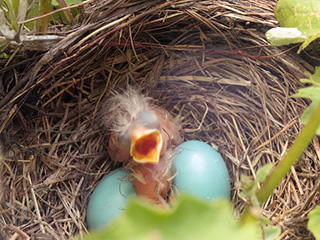Snake Attacked Baby Robins and Mom Wont Come Back
When y'all come across a helpless-looking baby bird out of its nest, information technology's difficult to resist the overpowering urge to come to the rescue.
→ But most of the time it'south best to practice nothing. ←
Many birds that people endeavor to rescue are notwithstanding being cared for past their parents (even if y'all can't see them) and should be left lone.
Here'south a primer on when to have action for songbirds (baby ducks or geese require a unlike approach); when in incertitude, contact a licensed wildlife rehabilitator.
Plant a baby bird?Wondering what to exercise? Bank check out our infographic > |
Appraise for Injury
The offset thing to exercise when you discover a baby songbird is to figure out if it'southward injured. Baby birds can naturally expect weak, just if y'all encounter blood or other obvious damage, contact a licensed wildlife rehabilitator.
You should also call a rehabilitator if you know a cat attacked a bird; felines transmit deadly bacterial infections with even mild scratches.
Decide Age
Babe birds become through three stages:
- Hatchling (usually 0-3 days old). Information technology hasn't withal opened its eyes, and may have wisps of downwards on its body. It's not prepare to leave the nest.
- Nestling (commonly iii-13 days quondam). Its optics are open, and its wing feathers may look like tubes because they've yet to break through their protective sheaths. It's too non ready to leave the nest.
- Fledgling (13-14 days onetime or older). This bird is fully feathered. Its wings and tail may be short, and it may not be a great flyer, merely it can walk, hop, or flutter. It has left the nest, though its parents may exist nearby, taking good care of it.
Assist Hatchlings and Nestlings
If you find a hatchling or a nestling on the ground and yous can run across its nest, you should try to safely return it. Contrary to pop conventionalities, birds do non have a well-developed sense of scent. Therefore, the parents won't know if a immature bird has been touched past people and will non carelessness their young.
If in that location'southward no nest, you can make ane by fastening a container to a branch. A small-scale basket is platonic, but you can apply a plastic container such equally a margarine tub and punch holes through the bottom. Sides should be no higher than 4 inches. Cut two pieces of wire to 18-inch lengths and thread them upwards through the lesser of the container and down again. Deeply wire it to the pinnacle of a branch in the aforementioned tree or shrub as the nest, and line the container with dry grass. Place the bird inside the handbasket.
Give Fledglings Room to Grow
If you find a fledgling, the best course of activeness is to exit it alone. Every bit awkward equally a fledgling bird may look, this is natural stage, and the parents are well-nigh probable nearby, hunting for food and keeping watch. If the bird's in immediate danger, yous can put it in a nearby bush or tree.
Don't Raise Baby Birds Yourself
Information technology's illegal to bring a baby bird dwelling and endeavor to heighten it. Most young birds won't survive if cared for by well meaning simply inexperienced people. Those that do survive will be at a disadvantage. They'll have missed important lessons that they would have learned from their parents, such as how to observe food and water in the wild and how to avoid predators.
Protect Baby Birds from Cats
While all birds are threatened by outdoor cats, babe birds are especially vulnerable. Birds should never be removed from the wild to protect them from cats or other predators. If there is a baby bird on the footing and a cat nearby, put the true cat indoors until the bird is able to wing. If the cat belongs to a neighbour, ask the owner to remove the cat or, when the possessor is non known, spray the cat with water to encourage it to leave the property.
Birds and the Constabulary
Birds are protected by federal laws nether the Migratory Bird Treaty Human activity (MBTA) of 1918 as well equally by Massachusetts state laws. Unless you're a licensed wildlife rehabilitator, it'due south illegal to keep wild birds in your possession. The only exceptions are non-native species: House Sparrows, European Starlings, and Pigeons.
Snake Attacked Baby Robins and Mom Wont Come Back
Source: https://www.massaudubon.org/learn/nature-wildlife/birds/baby-birds-out-of-the-nest

